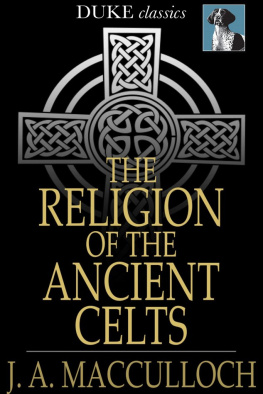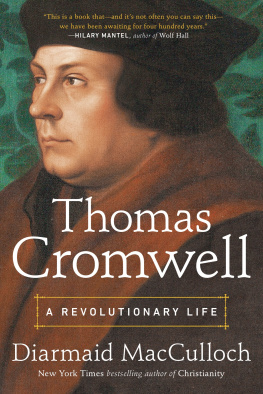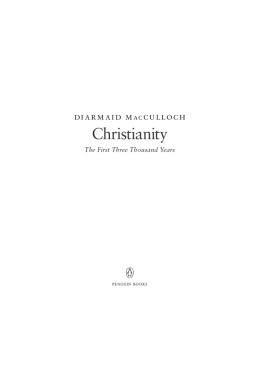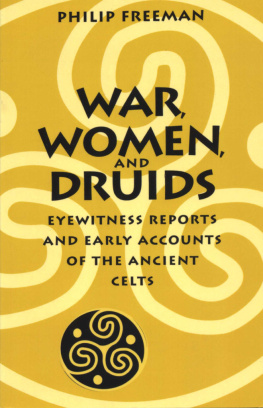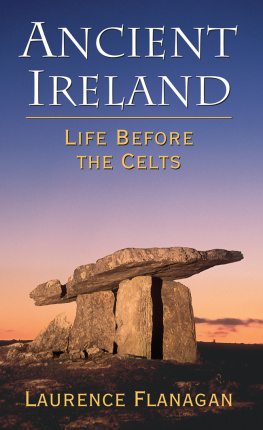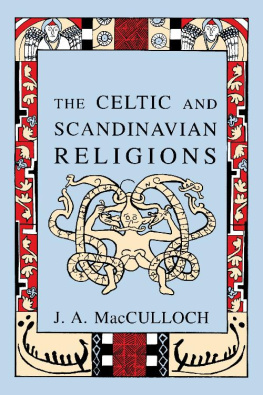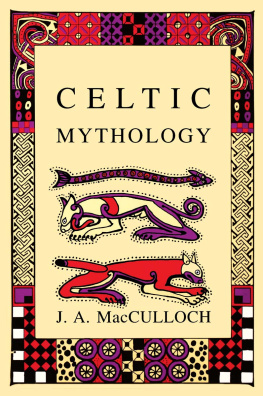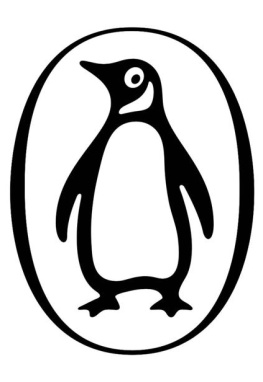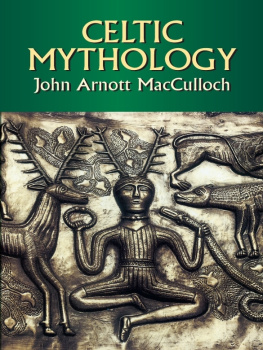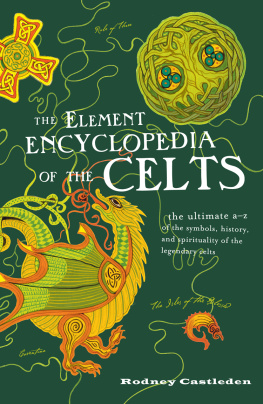THE RELIGION OF THE ANCIENT CELTS
* * *
J. A. MACCULLOCH
*
The Religion of the Ancient Celts
From a 1911 edition
ISBN 978-1-62011-392-9
Duke Classics
2012 Duke Classics and its licensors. All rights reserved.
While every effort has been used to ensure the accuracy and reliability of the information contained in this edition, Duke Classics does not assume liability or responsibility for any errors or omissions in this book. Duke Classics does not accept responsibility for loss suffered as a result of reliance upon the accuracy or currency of information contained in this book.
Contents
*
Preface
*
The scientific study of ancient Celtic religion is a thing of recentgrowth. As a result of the paucity of materials for such a study,earlier writers indulged in the wildest speculative flights andconnected the religion with the distant East, or saw in it the remainsof a monotheistic faith or a series of esoteric doctrines veiled underpolytheistic cults. With the works of MM. Gaidoz, Bertrand, and D'Arboisde Jubainville in France, as well as by the publication of Irish textsby such scholars as Drs. Windisch and Stokes, a new era may be said tohave dawned, and a flood of light was poured upon the scanty remains ofCeltic religion. In this country the place of honour among students ofthat religion belongs to Sir John Rhys, whose Hibbert Lectures Onthe Origin and Growth of Religion as illustrated by Celtic Heathendom(1886) was an epoch-making work. Every student of the subject since thattime feels the immense debt which he owes to the indefatigableresearches and the brilliant suggestions of Sir John Rhys, and Iwould be ungrateful if I did not record my indebtedness to him. In hisHibbert Lectures, and in his later masterly work on The ArthurianLegend, however, he took the standpoint of the "mythological" school,and tended to see in the old stories myths of the sun and dawn and thedarkness, and in the divinities sun-gods and dawn-goddesses and a hostof dark personages of supernatural character. The present writer,studying the subject rather from an anthropological point of view and inthe light of modern folk survivals, has found himself in disagreementwith Sir John Rhys on more than one occasion. But he is convincedthat Sir John would be the last person to resent this, and that, inspite of his mythological interpretations, his Hibbert Lectures mustremain as a source of inspiration to all Celtic students. More recentlythe studies of M. Salomon Reinach and of M. Dottin, and the valuablelittle book on Celtic Religion, by Professor Anwyl, have broken freshground.
In this book I have made use of all the available sources, and haveendeavoured to study the subject from the comparative point of view andin the light of the anthropological method. I have also interpreted theearlier cults by means of recent folk-survivals over the Celtic areawherever it has seemed legitimate to do so. The results are summarisedin the introductory chapter of the work, and students of religion, andespecially of Celtic religion, must judge how far they form a trueinterpretation of the earlier faith of our Celtic forefathers, much ofwhich resembles primitive religion and folk-belief everywhere.
Unfortunately no Celt left an account of his own religion, and we areleft to our own interpretations, more or less valid, of the existingmaterials, and to the light shed on them by the comparative study ofreligions. As this book was written during a long residence in the Isleof Skye, where the old language of the people still survives, and wherethe genius loci speaks everywhere of things remote and strange, it mayhave been easier to attempt to realise the ancient religion there thanin a busier or more prosaic place. Yet at every point I have felt howmuch would have been gained could an old Celt or Druid have revisitedhis former haunts, and permitted me to question him on a hundred matterswhich must remain obscure. But this, alas, might not be!
I have to thank Miss Turner and Miss Annie Gilchrist for valuable helprendered in the work of research, and the London Library for obtainingfor me several works not already in its possession. Its stores are aninvaluable aid to all students working at a distance from libraries.
J.A. MACCULLOCH.
THE RECTORY,BRIDGE OF ALLAN,October 1911.
List of Abbreviations Used in the Notes Throughout this Work
*
(This list is not a Bibliography.)
BRAND: Rev. J. Brand, Observations on the Popular Antiquities of GreatBritain. 3 vols. 1870.
BLANCHET: A. Blanchet, Trait des monnaies gauloises. 2 vols. Paris,1905.
BERTRAND: A. Bertrand, Religion des gaulois. Paris, 1897.
CAMPBELL, WHT: J.F. Campbell, Popular Tales of the West Highlands. 4vols. Edinburgh, 1890.
CAMPBELL LF: J.F. Campbell, Leabhar na Feinne. London, 1872.
CAMPBELL, Superstitions: J.G. Campbell, Superstitions of theHighlands and Islands of Scotland. 1900.
CAMPBELL, Witchcraft: J.G. Campbell, Witchcraft and Second Sight inthe Highlands and Islands of Scotland. 1902.
CORMAC: Cormac's Glossary. Tr. by J. O'Donovan. Ed. by W. Stokes.Calcutta, 1868.
COURCELLESENEUIL.: J.L. Courcelle-Seneuil, Les dieux gaulois d'aprsles monuments figurs. Paris, 1910.
CIL: Corpus Inscriptionum Latinarum. Berlin, 1863 f.
CM: Celtic Magazine. Inverness, 1875 f.
CURTIN, HTI: J. Curtin, Hero Tales of Ireland. 1894.
CURTIN, Tales: J. Curtin, Tales of the Fairies and Ghost World.1895.
DALZELL: Sir J.G. Dalzell, Darker Superstitions of Scotland. 1835.
D'ARBOIS: H. D'Arbois de Jubainville, Cours de litterature celtique.12 vols. Paris, 1883-1902.
D'ARBOIS Les Celtes: H. D'Arbois de Jubainville, Les Celtes. Paris,1904.
D'ARBOIS Les Druides: H. D'Arbois de Jubainville, Les Druides et lesdieux celtiques formes d'animaux. Paris, 1906.
D'ARBOIS PH: H. D'Arbois de Jubainville, Les premiers habitants del'Europe. 2 vols. Paris, 1889-1894.
DOM MARTIN: Dom Martin, Le religion des gaulois. 2 vols. Paris, 1727.
DOTTIN: G. Dottin, Manuel pour servir a l'tude de l'antiquitceltique. Paris, 1906.
ELTON: C.I. Elton, Origins of English History. London, 1890.
FRAZER, GB{2}: J.G. Frazer, Golden Bough{2}. 3 vols. 1900.
GUEST: Lady Guest, The Mabinogion. 3 vols. Llandovery, 1849.
HAZLITT: W.C. Hazlitt, Faiths and Folk-lore: A Dictionary of NationalBeliefs, Superstitions, and Popular Customs. 2 vols. 1905.
HOLDER: A. Holder, Altceltischer Sprachschatz. 3 vols. Leipzig, 1891f.
HULL: Miss E. Hull, The Cuchullin Saga. London, 1898.
IT: See Windisch-Stokes.
JAI: Journal of the Anthropological Institute. London, 1871 f.
JOYCE, OCR: P.W. Joyce, Old Celtic Romances{2}. London, 1894.
JOYCE, PN: P.W. Joyce, History of Irish Names of Places{4}. 2 vols.London, 1901.
JOYCE, SH: P.W. Joyce, Social History of Ancient Ireland. 2 vols.London, 1903.
JULLIAN: C. Jullian, Recherches sur la religion gauloise. Bordeaux,1903.
KEATING: Keating, History of Ireland. Tr. O'Mahony. London, 1866.
KENNEDY: P. Kennedy,

